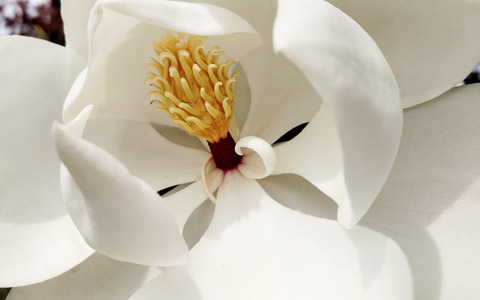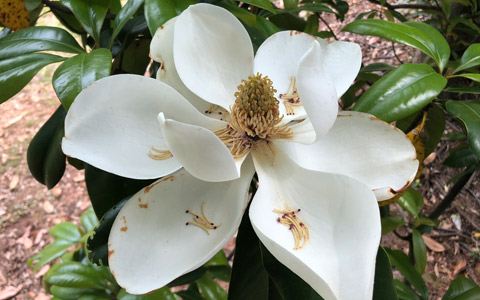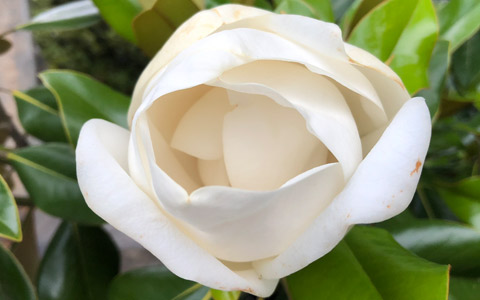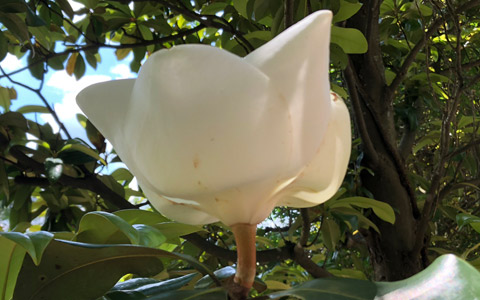Notice: Undefined variable: page in /home/vrxdg1855sn3/public_html/wp-content/themes/72tree/content.php on line 15
Notice: Trying to get property 'ID' of non-object in /home/vrxdg1855sn3/public_html/wp-content/themes/72tree/content.php on line 15
The Stunning Southern Magnolia Tree and its Flower

The Southern magnolia (Magnolia grandiflora) is an essential tree for yards and landscapes in hardiness zones 6 through 10, for its size, year-round beauty, and its enormous creamy white flowers.
72tree.com gathered essential information on the Southern magnolia tree, its characteristics, incredible flowers and their blooming season.
Magnolia Tree Information
Magnolia grandiflora, with its full luxurious look, is a favorite specimen around the world. The following are some of its features:
Family – Magnoliaceae
Height – 50 to 80 feet at maturity with some reaching 90 feet.
Width – The base of a fully mature magnolia can reach 40 feet in diameter.
Foliage – Mature leaves are dark glossy green and densely grow up to 8 inches in length by 5 inches wide.
DBH – The diameter at breast height of a fully mature magnolia tree can reach 24 to 36 inches.
Crown Width – This species grows in a pyramidal shape, its mid and lower sections can reach a diameter of 30 to 40 feet and tapers upward to a pointed or rounded crown.
Leaf Drop – While Magnolia grandiflora is an evergreen species, it will drop light foliage throughout the year.

Blooms – The flowers of Magnolia grandiflora are creamy white and can reach up to 12 inches in diameter.
Pests – While magnolia trees are generally free of significant pest problems, some varieties of scale, aphids, mealybugs, spider mites, and leafminers present potential infestations.
Disease – There are several fungi which can cause leaf spots, and in some cases, may lead to heart rot. However, for the most part, fungi are unable to cause any significant damage to adult magnolias. In the event of severe leaf drop or branch dieback, an arborist should be called to evaluate the situation and recommend a course of action.
This magnificent species, native to the southeastern United States, has been planted in cities all over the world. It’s no wonder that Magnolia grandiflora became an instant hit when it was taken to Europe in the 1700s.
Due to its adaptability to many climates and soil types, and its unique beauty, this species has become one of the most widely planted ornamental evergreen trees in the world.
To learn more about the USDA Hardiness Zone Map, read Trees, Shrubs, and the USDA Hardiness Zone Map at 72tree.com/trees-shrubs-usda-hardiness-zone-map/
Magnolia Tree Flower

The majestic Southern magnolia tree has an incredibly dominating presence from mid-summer through the end of winter. However, in early to mid spring, this specimen displays its true glory and reason for its worldwide admiration.
When the Southern magnolia blooms, it blooms at the tips of twigs all over with dozens of white lemon citronella-scented flowers open at a time. Healthy mature magnolias bloom consecutively until mid-summer, and these enormous flowers range in size, reaching up to 12 inches in diameter and lasting up to 7 days from bloom to wilt.
The Magnoliaceae family is among the eldest of tree families in existence. Due to this, we get to witness two pre-evolutionary aspects of flowers:
Tepals, not Petals – In magnolia flowers, the petals are fused with the sepals (sepals are typically green and function as protection for the flower while in bud); therefore, the correct terminology for these parts is tepals. The tepals of the magnolia flower are usually arranged in two whorls of 3 to 6 tepals each.

No Nectar Here – That’s correct, magnolia flowers do not produce nectar. These flowers attract pollinating beetles with their fragrant and sugary secretions.
The beautiful magnolia flower is the state flower of Mississippi and Louisiana, while the tree itself is the state tree of Mississippi. It should come as no surprise that the largest Southern magnolia is located in Smith County, Mississippi, measuring more than 122 feet tall with a DBH greater than 6 feet.
The Flowering Magnolia Grandiflora
If you live in the South and your landscape doesn’t include a Southern Magnolia, you’re missing out on one of the oldest and most beautiful blooming evergreen trees in existence.
In this article, you discovered a wealth of information about the Southern magnolia tree and its beautiful flowers.
If your property lies within hardiness zones 6 through 10, and you have yet to plant a magnolia tree, you should consider doing so for the beauty of the tree and the elegance of its sensational flowers.
Sources:
https://plants.ces.ncsu.edu/plants/all/magnolia-grandiflora/
https://hgic.clemson.edu/factsheet/magnolia/
https://www.arborday.org/trees/treeguide/TreeDetail.cfm?ItemID=863
https://edis.ifas.ufl.edu/st371
